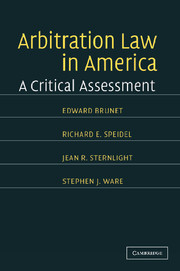Book contents
- Frontmatter
- Contents
- Acknowledgments
- Introduction
- 1 The Core Values of Arbitration
- 2 Common Legal Issues in American Arbitration Law
- 3 The Appropriate Role of State Law in the Federal Arbitration System: Choice and Preemption
- 4 Interstate Arbitration: Chapter 1 of the Federal Arbitration Act
- 5 Consumer Arbitration
- 6 International Commercial Arbitration: Implementing the New York Convention
- 7 Tension Points: Where the Authors Disagree
- Appendices
- Index
6 - International Commercial Arbitration: Implementing the New York Convention
Published online by Cambridge University Press: 16 November 2009
- Frontmatter
- Contents
- Acknowledgments
- Introduction
- 1 The Core Values of Arbitration
- 2 Common Legal Issues in American Arbitration Law
- 3 The Appropriate Role of State Law in the Federal Arbitration System: Choice and Preemption
- 4 Interstate Arbitration: Chapter 1 of the Federal Arbitration Act
- 5 Consumer Arbitration
- 6 International Commercial Arbitration: Implementing the New York Convention
- 7 Tension Points: Where the Authors Disagree
- Appendices
- Index
Summary
THE CASE FOR REVISION
INTRODUCTION
In this chapter, you will be exposed to the views of a law professor working in Chicago and San Diego and looking at international commercial arbitration from an American perspective. Although I have written extensively about American arbitration law and have taught international arbitration on a regular basis, I am not part of any arbitration “inner circle.” In that sense, I am free from the preferences that might evolve from association with a particular arbitration institution, serving regularly as an arbitrator, or being a partner in a major law firm representing clients who do commercial arbitration. I do have my preferences, however, and will state them up front.
First, I believe that arbitration is a vital ingredient in the continuing globalization of commerce. Whether conducted in the conventional manner or in cyberspace, arbitration will be the primary method of resolving disputes in an era where individuals and entities will, because of technological advances, be able to “conduct their affairs across a world without reference to nationality, government authority, time of day or physical environment.”
Second, I believe that the United States and other signatories of the New York Convention should work to achieve de-localized arbitration within the Convention framework through the interpretation of the Convention by the courts and the enactment of harmonious legislation to implement and supplement the Convention. By de-localized arbitration I mean a “species of international arbitration not derived from or based on a municipal legal order.
- Type
- Chapter
- Information
- Arbitration Law in AmericaA Critical Assessment, pp. 185 - 307Publisher: Cambridge University PressPrint publication year: 2006
- 1
- Cited by



